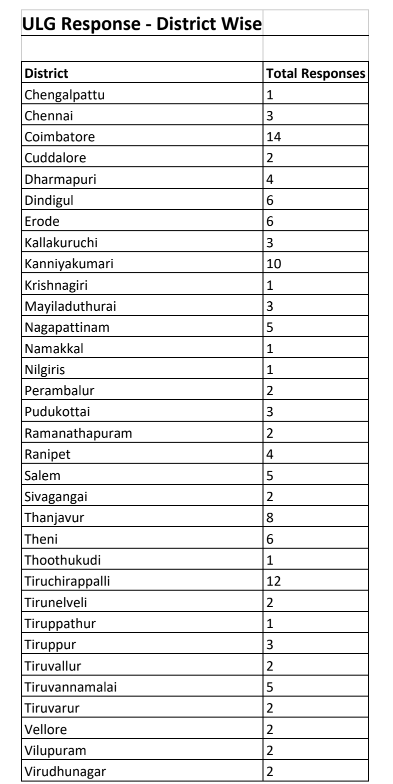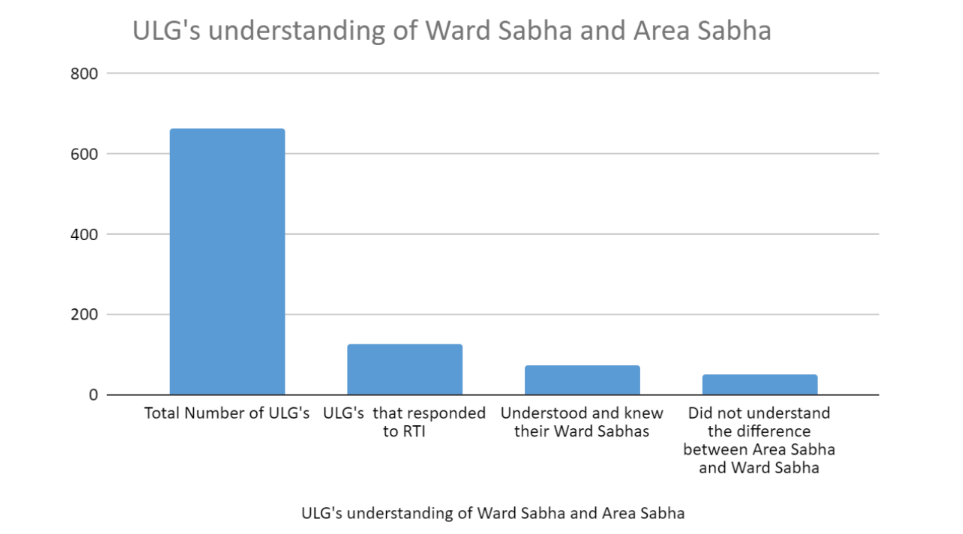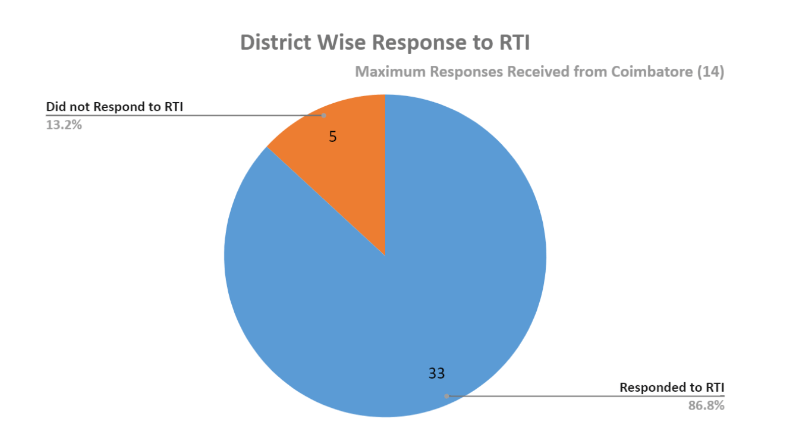It has been over two years since the State government notified the rules under the Tamil Nadu Urban Local Bodies Act Rules, 2023, which establish regulations for the functioning of Area Sabhas and Ward Sabhas throughout the state.
However, no information is available or being maintained in the public domain by any of the Urban Local Governments (ULGs) or the Department of Municipal Administration and Water Supply (MAWS) to track the functioning of these Area Sabhas. We at Voice of People, have repeatedly appealed for transparency by petitioning the State government.
Read more: Area Sabhas and Ward Committees: Power to the people or power with the officials?
Despite this, we had no option but to file Right to Information (RTI) applications with the relevant authorities to obtain information about the conduct of Area Sabhas and Ward Sabhas. We submitted RTIs to the Greater Chennai Corporation (GCC) regarding its 200 wards across 15 zones.
Additionally, we sent RTI inquiries to the Directorate of Municipal Administration (DMA) concerning 20 Municipal Corporations, and to the same directorate for information on all 138 Municipalities. We also reached out to the Directorate of Town Panchayats (DTP) for inquiries regarding all 490 Town Panchayats in Tamil Nadu.
Here is the information we sought:
- The Number of Wards in the ULGs
- Number of Area Sabhas constituted for each ward
- Number of Ward Sabhas constituted for each ward
- Number of Area Sabha meetings held in each ward between July 2022 and May 2024
- Number of Ward Sabha meetings held in each ward between July 2022 and May 2024
- Copies of the minutes of Area Sabha and Ward Sabha meetings held in each ward.
Our key findings about the functioning of ULGs
The RTI responses were collected over 90 days. The responses from the government and urban local bodies that received the RTIs were disappointing. Both the content of the responses and the overall number of replies from various districts highlight significant gaps in the implementation of mandates concerning Area Sabhas and Ward Sabhas in Tamil Nadu.
The initial responses to our RTIs were not actual replies. Instead, we received notices from the Public Information Officers (PIOs) of the DMA and GCC, redirecting our RTIs to the individual PIOs of all the local governments under their jurisdiction for direct responses.
Rather than taking responsibility and gathering the answers from all 663 ULGs internally, these bodies opted to pass the burden onto the individual ULGs, thereby avoiding accountability. As a result, we started receiving replies from all types of ULGs one by one in the following days.
Out of the 126 ULGs that responded to the RTIs, 108 (approximately 86%) reported conducting at least one Area Sabha between July 2022 and May 2024. Similarly, 103 ULGs (around 82%) indicated that they had held at least one Ward Sabha during the same period. Of the 108 ULGs that mentioned Area Sabhas, all conducted them between one and four times per ward over the past two years.

Read more: As India steps into her 73rd year, let’s ask for area sabhas in our city
Information on Area and Ward Sabhas
In addition, only 60% of the 126 ULGs that responded to the RTIs understood the difference between an Area Sabha and a Ward Sabha. This indicates that while they possess the necessary clarity, the remaining 40% lack this understanding and require further training and orientation.

Graph: Charu Govindan
The data collected and the statistics derived from the sample set of ULGs that responded to the RTIs demonstrate that most ULGs have conducted only about 1–3 Area Sabhas per ward in the last two years since the rules were notified. Except for a few ULGs, most have not conducted Ward Sabha meetings.
How many record minutes of the meetings?

Our findings regarding the minutes revealed that while some ULGs did respond, they provided no information. Additionally, around 49 ULGs asked us to pay and collect the responses in person. Forty-two ULGs did not respond at all, and about five ULGs refused to reply, citing the voluminous data and a lack of documentation. Only six attached the complete minutes of one or more meetings and 28 attached a few documents of the meeting minutes in their response.
Interestingly, a couple of ULGs blatantly replied that they do not maintain any minutes, but address the complaints and requests that arise in the meetings.
Counting the RTIs
The percentage of local governments that responded to our queries also tells us about their participation in the Right to Information Act and the overall transparency in the functioning of these bodies.
Only 19% of ULGs in Tamil Nadu responded, which amounts to 126 ULGs statewide. Only 20% of the GCC zones in Chennai and about 35% of the municipal corporations in the state replied to our RTI queries. Additionally, 27% of municipalities and 16% of town panchayats responded.

Graph: Charu Govindan
It is disappointing that even the GCC, one of the oldest and largest city corporations in the state and the country, has performed poorly in this RTI exercise.
As many as 33 out of 38 districts in Tamil Nadu sent their responses. The five districts that did not respond were Ariyalur, Kanchipuram, Karur, Madurai and Tenkasi. The districts that sent the maximum number of responses were Coimbatore (14), Tiruchirappalli (12) and Kanyakumari (10). In Chennai, we received replies from only three zones — Zone 1, Zone 2 and Zone 12.
The replies we received from these zones under the GCC are comparable to that of Town Panchayats. It is concerning that the ULG of the capital city, with its resources and infrastructure, performed so poorly in complying with the RTI Act of 2005. Moreover, these GCC zones only provided information regarding Area Sabhas and did not respond about Ward Sabhas.
The Municipal Corporations that rank next to GCC in their income and resources have performed better than all their counterparts in Tamil Nadu. Seven of the 20 Municipal Corporations sent their RTI responses in 90 days. These were Hosur, Nagercoil, Salem, Thanjavur, Thoothukudi, Tirunelveli and Vellore.
What is the legal mandate ?
The legal mandate is that for every quarter one Area Sabha meeting must be conducted in every Area Sabha constituted within the ward. That means for every quarter, the number of meetings held per ward should equal the number of Area Sabhas in that ward. Similarly, for every quarter, one Ward Sabha meeting needs to be held per each ward.
Quite shockingly, the data collected through this RTI exercise proves that not even a single ULG out of 126 that responded, irrespective of its type, has fulfilled this mandate for any single quarter covered from June 2022 to May 2024.
Recommendations and demands
To ensure that Sabhas function in their full constitutional spirit, it is not enough to notify the rules and issue orders. There must be a systematic way to demand accountability from the urban bodies.
Read more: Constant vigilance needed for effective local governance in Chennai
- The Government of Tamil Nadu should mandate and empower all ULGs to conduct quarterly Area Sabha and Ward Sabha meetings according to the guidelines and ensure that the meeting records are properly maintained in the public domain.
- In addition, social audits of these records must be conducted at least twice a year to hold the ULGs accountable and transparent. For the same reason, these reports must be available in the public domain.
- The MAWS department should also urge all the ULGs to make their councillors submit a list of Area Sabhas and Ward Sabhas being conducted in their wards in the monthly council which meet regularly.
According to our findings, the compliance of ULGs of all categories in Tamil Nadu to the rules governing Area Sabhas is abysmally low. In addition, the compliance of these bodies to the RTI exercise is only 19%.
This is a matter of grave concern. It reveals how the right to information of a common citizen is violated by 81% of the state’s urban local governments. This demonstrates the lack of interest among ULGs to follow the guidelines as per their mandate and be transparent to the public. A commitment to transparency and a tracking system could go a long way in ensuring that Area and Ward Sabhas remain active.
It is concerning that, despite the Tamil Nadu Urban Local Bodies Act Rules, 2023, having been in place for over two years, there is a lack of transparency regarding the functioning of Area Sabhas and Ward Sabhas. These bodies are meant to empower citizens and ensure that local governance is more participatory, yet without proper tracking and disclosure of their activities, it’s difficult for the public to hold them accountable.
The lack of publicly available information about the functioning of these bodies undermines the very purpose of their creation. It is encouraging that organizations like Voice of People are actively pushing for greater transparency and accountability. The State government should take this feedback seriously and make necessary reforms to ensure that the workings of Area and Ward Sabhas are openly accessible to the public. Transparency will not only improve trust in local governance but also encourage greater civic participation, leading to more effective decision-making.